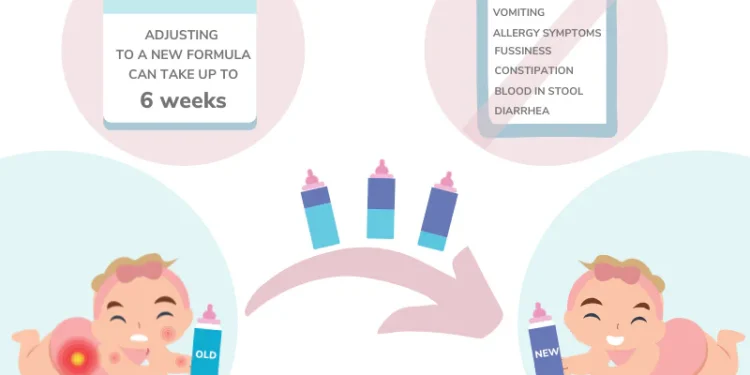When it comes to feeding your baby, it’s important to consider their unique dietary needs, especially if they have a sensitivity or allergy to certain ingredients. For some babies, traditional infant formula can cause allergic reactions, such as eczema, hives, or digestive issues. In these cases, a hypoallergenic formula may be necessary to provide the essential nutrients your baby needs without triggering an allergic response. Hypoallergenic formulas are specially designed to be gentle on the digestive system and are often made with extensively hydrolyzed proteins or amino acids to reduce the risk of allergic reactions. Understanding the need for hypoallergenic formula is crucial for ensuring your baby’s health and well-being, and it’s important to consult with a pediatrician to determine if this type of formula is the right choice for your little one.
Consulting with a Pediatrician
Before making any changes to your baby’s feeding routine, it’s essential to consult with a pediatrician to discuss any concerns or symptoms that may indicate a need for hypoallergenic formula. Your pediatrician can help assess your baby’s symptoms and determine if they may be related to a food allergy or sensitivity. They can also provide guidance on the best course of action, including whether or not to try a hypoallergenic formula. Additionally, your pediatrician can recommend specific brands or types of hypoallergenic formula that may be most suitable for your baby’s needs. By consulting with a pediatrician, you can ensure that you are making informed decisions about your baby’s nutrition and overall health.
Gradually Introducing the Hypoallergenic Formula
Once you and your pediatrician have decided to try a hypoallergenic formula for your baby, it’s important to introduce it gradually to allow your little one’s digestive system to adjust. Abruptly switching from one type of formula to another can cause discomfort and digestive upset for your baby. Instead, start by mixing small amounts of the hypoallergenic formula with your baby’s current formula and gradually increase the proportion of hypoallergenic formula over the course of several days. This gradual transition can help minimize any potential digestive issues and allow your baby to become accustomed to the new formula more easily.
Monitoring for Allergic Reactions
As you begin feeding your baby the hypoallergenic formula, it’s crucial to monitor them closely for any signs of allergic reactions or adverse effects. Keep an eye out for symptoms such as rashes, hives, vomiting, diarrhea, or excessive fussiness, as these may indicate that your baby is having a negative reaction to the new formula. If you notice any concerning symptoms, it’s important to contact your pediatrician right away for further guidance. Monitoring for allergic reactions is an essential part of ensuring that the hypoallergenic formula is a safe and suitable option for your baby.
Making Adjustments as Needed
In some cases, despite your best efforts, your baby may still experience allergic reactions or digestive issues when consuming a hypoallergenic formula. If this occurs, it’s important to work closely with your pediatrician to make any necessary adjustments to your baby’s feeding plan. This may involve trying a different brand or type of hypoallergenic formula, adjusting the feeding schedule, or exploring other potential solutions to address your baby’s specific needs. Making adjustments as needed is an ongoing process that requires patience and open communication with your pediatrician to ensure that your baby is receiving the best possible care.
Providing Comfort and Support for Your Baby
During this time of transition and potential dietary adjustments, it’s important to provide comfort and support for your baby as they adapt to the new hypoallergenic formula. Be attentive to their cues and needs, offer plenty of cuddles and soothing activities, and maintain a calm and nurturing environment to help them feel secure and cared for. Additionally, continue to monitor their overall well-being and seek guidance from your pediatrician if you have any concerns about their comfort or health. Providing comfort and support for your baby is essential for helping them navigate this period of change with as much ease as possible.
Seeking Additional Support and Resources
If you find yourself feeling overwhelmed or uncertain about managing your baby’s dietary needs and potential allergies, don’t hesitate to seek additional support and resources. This may include reaching out to other parents who have experience with hypoallergenic formula, joining online support groups or forums, or seeking guidance from a lactation consultant or infant nutrition specialist. Additionally, consider discussing any emotional or logistical challenges with your pediatrician or a mental health professional who can offer guidance and support. Seeking additional support and resources can help you feel more confident and empowered in caring for your baby’s unique dietary needs.
Understanding the need for hypoallergenic formula and navigating the process of introducing it to your baby requires careful consideration, communication with healthcare professionals, and ongoing monitoring and support. By consulting with a pediatrician, gradually introducing the new formula, monitoring for allergic reactions, making adjustments as needed, providing comfort and support for your baby, and seeking additional resources when necessary, you can ensure that your little one receives the best possible care for their specific dietary needs. Remember that every baby is unique, so it’s important to approach this process with patience, flexibility, and a willingness to seek guidance when needed. With the right support and information, you can confidently navigate this journey and help your baby thrive.
















